- Home
- Conn Iggulden
The Field of Swords Page 29
The Field of Swords Read online
Page 29
The Senate had borne the change in power well enough at first, but then the factions had begun to form, and with new men like the merchants Clodius and Milo entering the Senate, it had become a dangerous game for all of them. Rumors had spread that Bibilus had been killed or mutilated, and twice the Senate had demanded he be shown alive to them and made to explain his absence. Pompey had allowed them to send letters to the consul, but Julius’s word had been good. Bibilus had not come and visitors to his house found it barred and dark.
After two debates had come close to violence, Pompey had his soldiers stand guard over the sessions, ignoring the protests of the senators. Now they paraded their dissatisfaction in front of the people, making the dispute public. Though Crassus found Pompey’s fury amusing, he worried for what would come of it.
“No man rules Rome alone, my friend,” Crassus murmured.
Pompey glanced sharply at him. “Show me the laws I have broken! My tribunes are appointed rather than elected. They were never meant to bring the work of the Senate to a complete halt, and now they do not.”
“The balance in the system has been altered, Pompey. It is not a minor change you have brought about. The tribunes were the voice of the mob. You risk a great deal in altering that. And the Senate are discovering new teeth if they act together against you,” Crassus replied.
Pompey’s shoulders slumped in weariness, but Crassus felt no sympathy. The man went at politics as if every problem could be met head-on. He was a fine general but a poor leader of a city, and the last one to know that truth was apparently Pompey himself. The very fact that he had asked to meet Crassus privately was proof of the problems Pompey faced, even though he would not ask outright for advice.
“They were meant to limit the power of the Senate, Pompey. Perhaps they were wrong to block you so completely, but replacing them has earned you nothing but anger in the city.”
Pompey flushed again and Crassus continued quickly, trying to make him understand. “If you restore their posts to the vote, you will regain a great deal of the ground you have lost,” he urged. “The factions will believe they have won a victory and fall apart. You should not let them grow any stronger. By Jupiter himself, you should not. You have made your point. Let it be known now that you care as much as they for the traditions of Rome. The laws you passed cannot be undone, after all.”
“Let those sneering dogs back in to veto me?” Pompey snapped.
Crassus shrugged. “Those, or whoever else the citizens elect. If it is the same men, you may have a difficult time of it for a while, but this is not an easy city to rule. Our people are fed on a diet of democracy from childhood. At times, I think they have dangerously high expectations. They do not like to see their representatives taken from them.”
“I will think about it,” Pompey said reluctantly, looking away across the forum.
Crassus doubted he fully understood the danger. As far as Pompey was concerned, the resistance in the Senate was a passing thing, not the kernel that could lead to open rebellion.
“I know you will make the right decision,” Crassus said.
Julius rubbed his face wearily. How long had he slept, an hour? He couldn’t remember exactly when he had passed out, but he thought the sky had been growing light. The colors seemed to have been washed out of the province, and Mark Antony’s voice had taken on a whining tone Julius had not noticed before. While half the legions were bleary-eyed and pale, Mark Antony looked as if he were ready for a parade, and Julius was convinced he felt a moral superiority over those who had indulged the night before. The general’s lips pursed as he listened to Julius’s report of the agreement with Mhorbaine.
“I wish you had consulted me before you pledged your support,” Mark Antony said, barely hiding his irritation at what he had heard.
“From what Mhorbaine said, this Ariovistus would be trouble for us at some point. Better to deal with him now, before he is so deeply rooted we’d never be able to throw him back over the Rhine. We do need allies, Mark Antony. The Aedui have promised three thousand of their cavalry at my disposal.”
Mark Antony struggled with his temper for a moment. “Yes, they will promise us anything, sir. I will not believe it until I see them. I warned you Mhorbaine is a clever leader, but it looks as if he has somehow managed to set the two most powerful armies in Gaul at each other’s throats. No doubt Ariovistus has pledged friendship as well, with the Aedui profiting from a war that could break both of their enemies.”
“I’ve seen nothing in Gaul that could stand against us,” Julius said dismissively.
“You have not seen the Germanic tribes. They live for war, keeping a professional class in the field at all times, supported by the rest of their people. And in any case, Ariovistus is . . .” Mark Antony sighed. “Ariovistus cannot be touched. He is already a friend of Rome, named so ten years ago. If you take the field against him, the Senate could well remove your command.”
Julius turned and gripped the larger man by the shoulders. “Do you not think this is something I should have been told?” he demanded.
Mark Antony looked back at him, flushing. “I did not think you would make such a promise to Mhorbaine, sir. You barely even know the man! How could I possibly have foretold that you would pledge the legions nearly three hundred miles across the country?”
Julius dropped his hands from his general and stood back. “Ariovistus is a ruthless invader, Mark Antony. My only allies have asked me to help them. I’ll tell you honestly that I do not care if Mhorbaine hopes to see us broken against each other or not. I do not care if Ariovistus is twice the warrior you tell me. Why do you think I brought my legions to Gaul? Have you seen this land? I could drop a handful of seeds anywhere and see corn spring up before I could turn round. There are forests enough to build fleets, herds of cattle so great they could never be counted. And beyond Gaul? I want to see it all. Three hundred miles is just a step of the way I have in mind. We are not here for a summer, General. We are here to stay, just as soon as I have cut the path for the rest to follow.”
Mark Antony listened in astonishment. “But Ariovistus is one of ours! You can’t just—”
Julius nodded, holding up a hand. Mark Antony fell silent.
“It will take a month to build a road from here to the plain for the ballistae and onagers. I do not intend to go to war without them again. I will send a messenger to this Ariovistus, asking for a meeting. I will address him with the respect due to a friend of my city. Will you be satisfied then?”
Mark Antony sagged with relief. “Of course, sir. I hope you are not offended at my words. I was thinking of your position at home.”
“I understand. Perhaps you could send a messenger to me to receive the letter,” Julius replied, smiling.
Mark Antony nodded and left the room. Julius turned to Adàn, who had listened to the conversation with an open mouth.
“What are you gaping at?” Julius snapped, instantly regretting the words. His head throbbed and his stomach felt as if it had been squeezed dry by vomiting in the night. A vague memory came of staggering out to the bathhouse in the dark and losing great gushes of dark fluid into the gutters there. Only yellow bile remained, but still it churned and surged up his throat.
Adàn chose his words carefully. “It must have been this way for my country, once. Romans deciding the future for us, as if we had no say at all in the matter.”
Julius began a sharp reply, then thought better of it. “Do you think the men of Carthage wept over their conquests? And how do you think your people decided the fate of those they found when they came to Spain? These Celts came from some foreign land. Do you think your ancestors troubled themselves over the original inhabitants? Perhaps even they were invaders from some distant past. Do not think your people are better than mine, Adàn.”
Julius gripped the bridge of his nose, closing his eyes against the throbbing headache. “I wish I had a clear head to tell you what I mean. It is more than just the strength that matters.
Carthage was strong, but beating them changed the world. Greece was once the greatest power, but when they weakened, we came and made them ours. Gods, I drank too much wine for an argument this early.”
Adàn did not interrupt. He sensed that Julius was on the edge of something important, and he strained forward in his chair to hear. Julius’s voice had a hypnotic quality, almost a whisper.
“Countries are taken in blood. Women are raped, men killed, every horror you can imagine occurs a thousand times over, but then it ends and the victors settle the land. They farm and build cities and make laws. The people thrive, Adàn, whether you like it or not. Then there is justice and rule of law. Those who prey on their neighbors are executed, cut out from the rest. They have to be, because even conquerors grow old and value peace. The blood of the invaders is mingled with the people on the land until a hundred years later they are not Celt or Carthaginian, or even Roman. They are like . . . wine and water, impossible to separate. It begins in battle, but they are raised by each wave, Adàn. I tell you if I ever find a country that has not been tempered in fire, I will show you savages where we have built cities.”
“You believe this?” Adàn asked.
Julius opened his eyes, the dark pupils gleaming. “I do not believe in a sword, Adàn, because I can see it. It is just the truth. Rome is more than iron swords and harder men. I will bring them up, kicking and screaming. Gaul will suffer under my hand, but I will make them greater than they can imagine by the time I’m done.”
The messenger sent by Mark Antony arrived at the door, clearing his throat softly to draw their attention. Both men snapped out of the reverie and Julius groaned, holding his head.
“Find me a cold cloth and see if Cabera has any of his powders for pain,” he told the young man. As he turned back, he saw Adàn’s expression was grim.
“It is a strange view, General,” the young Spaniard ventured. “I can see why you would think such a thing, with an army poised to rush over Gaul. But it will be little comfort to the families that lose their men in the days to come.”
Julius felt anger spike in him as the headache throbbed. “Do you think they are weaving flowers for each other while we sit here? The tribes are at each other’s throats, boy. At forty years old, Mhorbaine’s one of the tribal ancients. Think of that! Disease and war take them before they go gray. They may hate us, but they hate each other a great deal more. Now, let us leave this for another time. I have a letter to dictate for this Ariovistus. We will ask this ‘Friend of Rome’ to go quietly back from the lands he has conquered and leave Gaul behind him.”
“Do you think he will?” Adàn asked.
Julius did not answer, but gestured for Adàn to take up his writing tablet and began to dictate the letter to the king of the Suebi.
Clearing the forests for the new road out to the plain took longer than Julius had hoped. Though the legions worked full days in the summer heat, each massive oak had to be cut down and then dragged out by teams of axmen and oxen. Cabera had begun to train some of the legion boys as assistants to deal with the broken bones and wounds that were the inevitable result of such labor. Two months passed agonizingly slowly before the first stone could be laid, but by the end of the fourth, the flat stones stretched almost forty miles, wide and strong enough to take the great catapults and siege machines without a tremor. New quarries had been dug in the hills and granite posts marked the miles from Rome, spreading the shadow farther than it had reached before.
Julius gathered his council in the hall of the Roman buildings, Mhorbaine and Artorath sitting with them as his favored allies. He looked round at them all, resting his gaze at last on Adàn, who was looking strangely at him. The young Spaniard had translated the messages that had flown between Ariovistus and the Roman province, and, of all of them, he knew what Julius was about to say. Julius wondered if there had ever been a time when he was as innocent as the young Spaniard. If there had been, it was too far back to remember.
Ariovistus had not been an easy man to reach. The first two messengers had been sent back with the briefest of replies, disdaining any further interest in Julius or his legions. Mark Antony had managed to impress Julius with the need to walk carefully around the king, but the wording was dismissive and infuriating. At the end of the first month, Julius was waiting only for the road to be finished before taking his legions out to crush Ariovistus, friend of Rome or not. Yet he needed to be seen to have made every attempt to settle the issue peacefully. He knew Adàn was not the only one of his men sending letters back to Rome. Pompey would have spies keeping him well informed, and the last thing Julius wanted was to have Rome declare him an enemy of the state for his actions. Such a thing was far from impossible with Pompey at the head of the Senate. No doubt the man had the senators trained to perfection, and a single vote could remove Julius’s authority at a stroke.
The weeks had passed slowly enough, with the days filled with meeting the tribal leaders, promising them whatever they wanted if they would allow passage through their lands and provide supplies for the army as they marched. Brutus had taken to the language with a flair that surprised them both, and already he was able to take part in the negotiations, though his efforts reduced the Gauls to tears of laughter on occasion.
Adàn looked away as Julius smiled at him. The longer he spent in the company of the Roman leader, the more confused he felt. At times, when Julius tried to put him at his ease, Adàn could feel the immense personal charm and understand why others followed him. Then there were moments when he could not believe the utter callousness of the generals as they decided the fate of millions in their councils. He could never decide if Julius was as ruthless as men like Renius, or whether he truly believed bringing Rome to Gaul was a better path for the tribes than any they could have found on their own. It did matter to the young man. If he thought Julius believed his own words about the glories of civilization, Adàn could justify the respect he felt for him. If it was all a game, or a mask for conquest, then Adàn had made the biggest mistake of his life in leaving Spain to follow him.
“Ariovistus has scorned my messengers once again,” Julius said to his generals. They exchanged glances. “Though Mark Antony has expressed a desire for me to uphold the title of friend conferred on him, I cannot ignore the arrogance of this king. The scouts have reported a large army gathering on his borders for further conquest, and I have agreed to safeguard Aedui lands with our legions.”
Julius flickered a glance at Mark Antony, who kept his eyes on the long table.
“Mhorbaine’s cavalry will accompany the extraordinarii, for which I thank him,” Julius continued. Mhorbaine inclined his head with a wry smile.
“As this Ariovistus has given service to Rome in the past, I will continue to send my messengers as we march. He will have every chance to meet me and create a peaceful resolution. I have informed the Senate of my actions and await a reply, though it may not come before we leave.”
As they watched, Julius unrolled a map of the thinnest calfskin vellum. He placed lead weights at the corners and the men rose from their chairs to look at the land he revealed to them.
“The scouts have marked the hills for us, gentlemen. The region is named Alsatia, three hundred miles to the north and west.”
“It borders the Helvetii land,” Brutus murmured, poring over the map Mhorbaine had given them. It was little better than a set of painted regions, without detail, but none of the Romans in the room had seen that part of Gaul and were fascinated.
“If we do not send the Suebi back over the Rhine, the Helvetii will not survive the next summer,” Julius replied. “After that, Ariovistus may look farther south to our own province. It is our duty to establish the Rhine as the natural border for Gaul. We will resist any attempt to cross it, no matter what the source. If necessary, I will bridge it and lead punishment raids deep into their own land. This Ariovistus has become arrogant, gentlemen. The Senate has let him run loose for far too long.”
He ignored Mark A
ntony’s wince at his words.
“Now let us prepare the marching order. Though I can hope for peace, we must prepare for war.”
CHAPTER 27
_____________________
After the rush to meet and turn the Helvetii, the more formal march along the new road was almost restful for the legion veterans. Though the days were still heavy with heat, the trees had begun their turn, already tinged with a thousand shades of red and brown. Crows lifted from the forests as they passed through, their voices harsh with warning. On the empty plains, it was easy for the legionaries to imagine they were the only men for a thousand miles.
Julius kept the Tenth and extraordinarii at the front. The Aedui riders were given into the care of Domitius and Octavian and began to learn the discipline Julius required of his allies. Though he had been grateful to Mhorbaine for the added force, he had made it clear that they had to learn to follow orders and structure themselves in the Roman fashion. The extraordinarii had a busy time with the Gaulish riders, who seemed individualists to a man and not at all used to any form of organized attack.
The great war machines accompanied the march, strapped down and safe while they were on the move, but with their expert teams close to them. Each of the heavy ballistae had a personal name cut into the great blocks of beech, and each legion preferred to use its own, loyally certain that they could throw farther and more accurately than any of the others. The scorpion bows looked little more than cartloads of spars and iron before assembly. The heavy arms took three men to reset after each shot, but the bolt could punch through a horse and kill another behind it. They were valued weapons and the legionaries who came close would often reach out to touch the metal for luck.

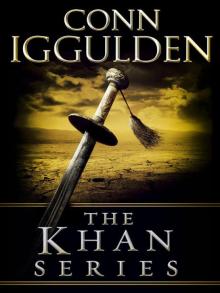 The Khan Series 5-Book Bundle
The Khan Series 5-Book Bundle Tollins 2: Dynamite Tales
Tollins 2: Dynamite Tales Tollins: Explosive Tales for Children
Tollins: Explosive Tales for Children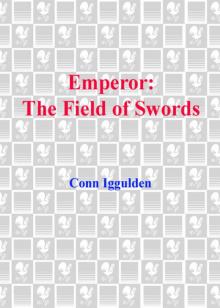 The Field of Swords
The Field of Swords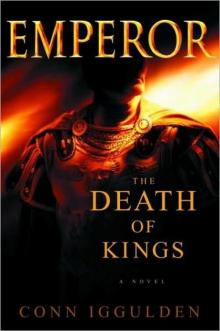 The Death of Kings
The Death of Kings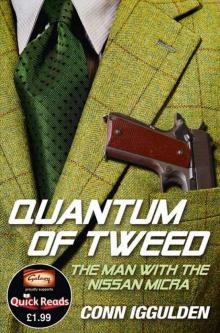 Quantum of Tweed: The Man With the Nissan Micra
Quantum of Tweed: The Man With the Nissan Micra Bones of the Hills
Bones of the Hills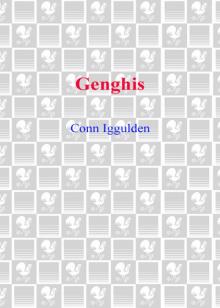 Genghis: Birth of an Empire
Genghis: Birth of an Empire The Gates of Rome
The Gates of Rome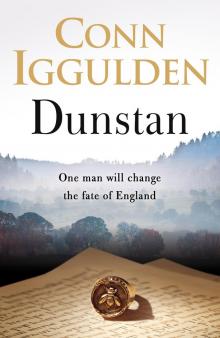 Dunstan
Dunstan Fig Tree
Fig Tree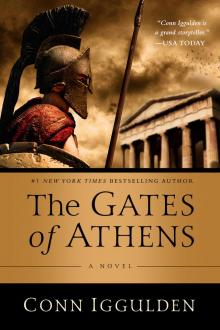 The Gates of Athens
The Gates of Athens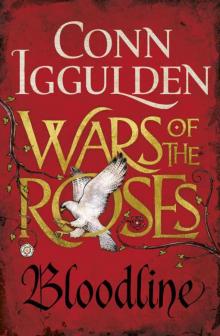 Stormbird
Stormbird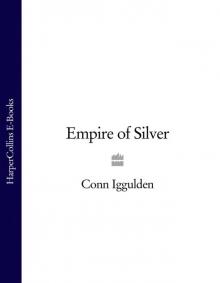 Khan: Empire of Silver
Khan: Empire of Silver The Abbot's Tale
The Abbot's Tale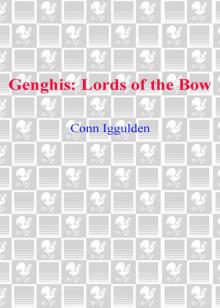 Gengis: Lords of the Bow
Gengis: Lords of the Bow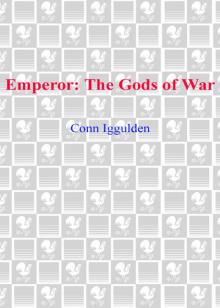 The Gods of War
The Gods of War Blackwater
Blackwater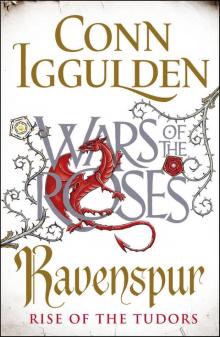 Ravenspur: Rise of the Tudors
Ravenspur: Rise of the Tudors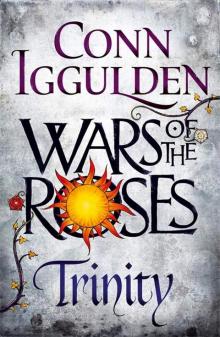 Wars of the Roses: Trinity (War of the Roses Book 2)
Wars of the Roses: Trinity (War of the Roses Book 2) The Gods of war e-4
The Gods of war e-4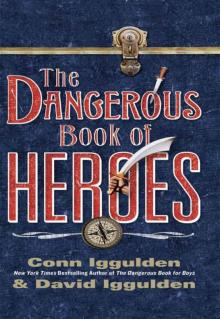 The Dangerous Book of Heroes
The Dangerous Book of Heroes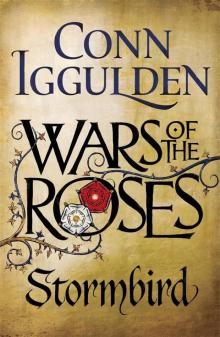 Stormbird wotr-1
Stormbird wotr-1 Emperor: The Death of Kings
Emperor: The Death of Kings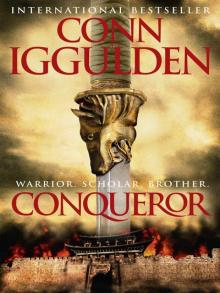 Conqueror (2011) c-5
Conqueror (2011) c-5 The Dangerous Book for Boys
The Dangerous Book for Boys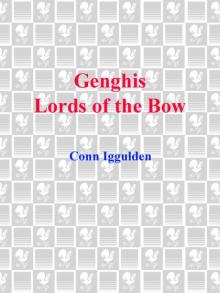 Genghis Lords of the Bow
Genghis Lords of the Bow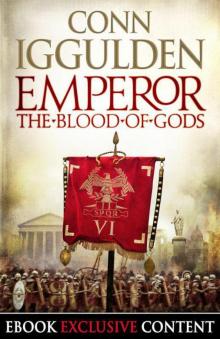 Emperor: The Blood of Gods (Special Edition) (Emperor Series, Book 5)
Emperor: The Blood of Gods (Special Edition) (Emperor Series, Book 5) The Emperor Series: Books 1-5
The Emperor Series: Books 1-5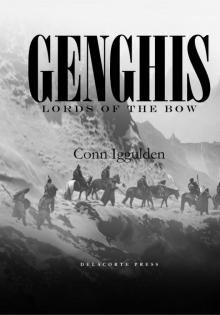 Lords of the Bow c-2
Lords of the Bow c-2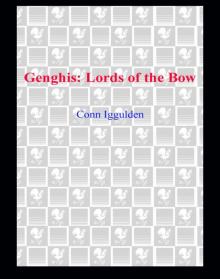 Lords of the Bow
Lords of the Bow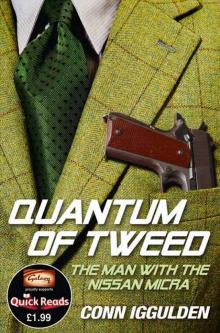 Quantum of Tweed
Quantum of Tweed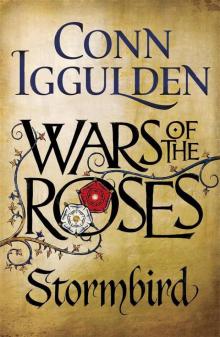 Wars of the Roses 01 - Stormbird
Wars of the Roses 01 - Stormbird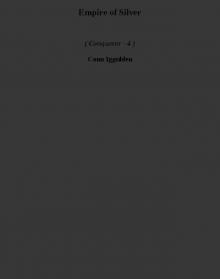 Empire of Silver c-4
Empire of Silver c-4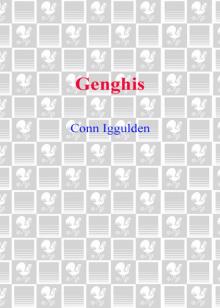 Birth of an Empire
Birth of an Empire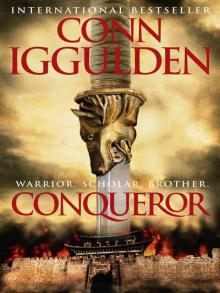 Conqueror (2011)
Conqueror (2011)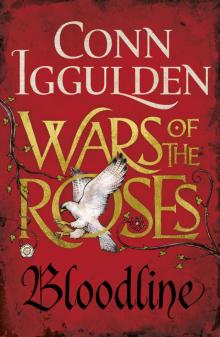 Wars of the Roses: Bloodline: Book 3 (The Wars of the Roses)
Wars of the Roses: Bloodline: Book 3 (The Wars of the Roses) Bones Of the Hills c-3
Bones Of the Hills c-3 Empire of Silver
Empire of Silver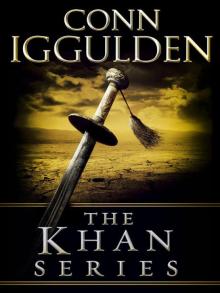 The Khan Series 5-Book Bundle: Genghis: Birth of an Empire, Genghis: Bones of the Hills, Genghis: Lords of the Bow, Khan: Empire of Silver, Conqueror
The Khan Series 5-Book Bundle: Genghis: Birth of an Empire, Genghis: Bones of the Hills, Genghis: Lords of the Bow, Khan: Empire of Silver, Conqueror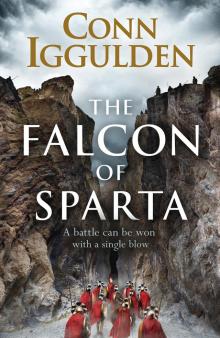 The Falcon of Sparta
The Falcon of Sparta Explosive Tales for Children
Explosive Tales for Children